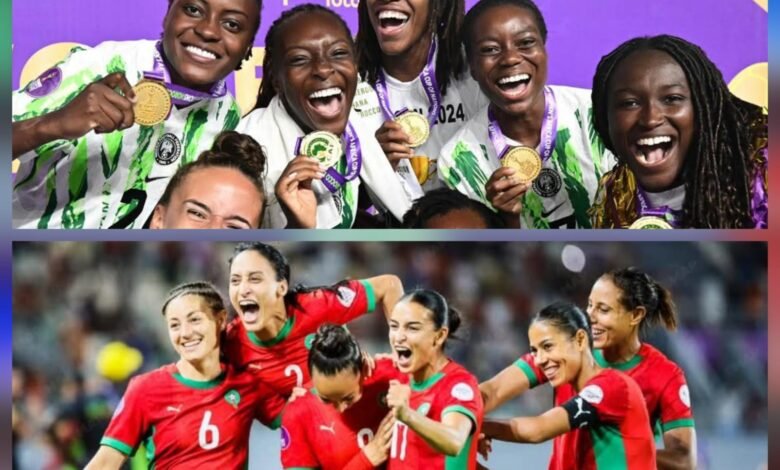Nigeria Win 10th Women’s Africa Cup of Nations Title After 3–2 Final Victory Over Morocco

By Karima Rhanem, Senior Managing Editor
Nigeria were crowned champions of the 2025 Women’s Africa Cup of Nations on Saturday, July 26, following a 3–2 victory over Morocco in an intense final played at Olympic Stadium of Rabat. The result secured Nigeria’s tenth WAFCON title, a landmark achievement that underscores their continued excellence in African women’s football.
The match was fiercely contested from the outset. Morocco, backed by a passionate home crowd, struck first in the 12th minute through captain Ghizlane Chebbak, who placed a long-range effort beyond goalkeeper Chiamaka Nnadozie. Before the half-hour mark, Morocco doubled their lead when Sanaâ Mssoudy reacted quickly to a rebound inside the box. At halftime, the hosts led 2–0 and appeared firmly in control.
However, Nigeria responded with composure and tactical clarity. In the 64th minute, following a VAR review for handball, a penalty was awarded and converted by Esther Okoronkwo. The equaliser came just minutes later, with Okoronkwo once again involved—this time providing the assist for Folashade Ijamilusi, whose well-timed finish levelled the match. In the 88th minute, Nigeria completed the comeback as substitute Jennifer Echegini headed in from a corner to secure the title.
While Nigeria lifted the trophy, the quality and discipline of Morocco’s performance must be acknowledged. Their ability to control large phases of the match, especially in the first half, reflects the evolution of their women’s national program. Reaching the final in just their second-ever WAFCON appearance—after making their debut in 2022—is a remarkable step, particularly considering the calibre of opposition they faced, including Nigeria, a team with nine previous titles.
Morocco’s presence in this final is not accidental. In recent years, the Royal Moroccan Football Federation has made strategic investments in the women’s game, establishing professional league structures, supporting grassroots programs, and integrating women’s teams into club systems across the country. These efforts have produced visible results. The team, under the direction of coach Reynald Pedros, has developed a defined identity—combining technical precision with tactical discipline—and the individual quality of players like Chebbak, Jraïdi, and Mssoudy was clear throughout the tournament.
Nigeria’s journey to the title included wins over Tunisia, Algeria, and Botswana in the group stage, followed by a commanding 5–0 win over Zambia in the quarter-finals. They edged South Africa 1–0 in the semi-final before meeting Morocco in the final. Across six matches, they scored 15 goals and conceded only three, a testament to their defensive balance and attacking depth. Players such as Okoronkwo, Ajibade, Payne, and Nnadozie were influential across multiple rounds, showing not just talent, but consistency under pressure.
The officiating in the final, including the use of VAR, was a point of discussion. The penalty awarded to Nigeria after a VAR review shifted the match’s momentum, and while the decision followed protocol, it understandably drew reactions from both teams. As with any high-stakes final, officiating is closely scrutinised, and such moments highlight the importance of continuing to improve VAR communication and transparency. Nevertheless, both sides competed with intensity and professionalism, and the integrity of the contest remained intact.
Beyond the scoreline, this final served as a broader reflection of progress in African women’s football. Nigeria, with their history and experience, executed a performance worthy of champions. Morocco, playing in front of their home supporters, demonstrated that they belong on this stage—not as guests, but as credible finalists with technical skill, tactical structure, and the mental resolve to challenge the very best.
As Nigeria celebrates a historic tenth title, the football community also recognises the value of Morocco’s performance. Competing against a team with Nigeria’s record and leading for much of the match is an achievement of substance. It signals the emergence of a team with clear ambition, supported by an institution that has committed to the growth of the women’s game.
In victory and in defeat, the 2025 Women’s Africa Cup of Nations final provided a contest of high quality and mutual respect. Nigeria’s triumph will be remembered as a milestone. Morocco’s presence will be remembered as a turning point.





